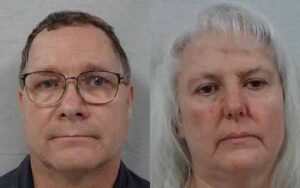
BIRMINGHAM, Ala. (BP) — The Ethics & Religious Liberty Commission has been, and will be, helping Southern Baptists address the sexual abuse crisis in churches, Russell Moore said during the entity’s report Wednesday (June 12) at the convention’s annual meeting.
 Moore, the ERLC’s president, told messengers the entity has been privileged to work with SBC President J.D. Greear and the Sexual Abuse Advisory Study he formed last summer to assist churches in the effort to prevent abuse and care for survivors. The study group issued a report with recommendations June 8 and has worked with the ERLC to produce free curriculum published by LifeWay Christian Resources and a year-long initiative to equip churches to address sexual abuse.
Moore, the ERLC’s president, told messengers the entity has been privileged to work with SBC President J.D. Greear and the Sexual Abuse Advisory Study he formed last summer to assist churches in the effort to prevent abuse and care for survivors. The study group issued a report with recommendations June 8 and has worked with the ERLC to produce free curriculum published by LifeWay Christian Resources and a year-long initiative to equip churches to address sexual abuse.
Addressing the crisis now is vital, Moore said.
“Southern Baptists, we have reached our age of accountability, and the vital question before us today is: ‘What will we do next?'” he told the messengers.
“The stakes are too high,” Moore said. “The implications for vulnerable people and our moral witness are too great.
“Brothers and sisters, we must speak with unflinching clarity to a watching world and say: ‘Those who would use religion to prey on those looking to hear a word from Jesus are more than just criminals, although they are certainly that. They are those who commit spiritual rape of the most incestuous and violent kind and we, the people of the church of the Lord Jesus Christ, will not stand for it for one minute.'”
The need to help churches at this time address sexual abuse caused the ERLC to scrap plans for its 2019 National Conference, Moore said. Instead of focusing on “Gospel courage” as originally intended, the ERLC announced in late April it would reinvent the program to address the sexual abuse crisis. The conference — titled “Caring Well: Equipping the Church to Confront the Abuse Crisis” — will be Oct. 3-5 at the Gaylord Texan in Grapevine, Texas.
In addition, the ERLC worked this year with a member of its Research Institute and a Texas legislator for the successful passage of a bill to grant civil immunity to churches that reveal credible sexual abuse allegations to possible employers.
The ERLC also has focused its efforts in the last year on the issues of sanctity of life and human dignity, racial unity, religious liberty, artificial intelligence and cultural division.
Regarding the sanctity of human life, Moore said, “We at the ERLC wake up in the morning and imagine what a post-Roe America would look like. We imagine that and work toward that future.” Roe v. Wade is the U.S. Supreme Court’s 1973 ruling that legalized abortion.
Among the ways the ERLC works toward such a future, Moore said, is its annual Evangelicals for Life (EFL) conference. The next EFL will be Jan. 23-24 in Washington, D.C.
Another way is to help provide ultrasound machines to pregnancy care centers through the ERLC’s Psalm 139 Project. In the last year, Psalm 139 placed machines at centers in Baltimore, Birmingham, Dallas, Kansas City and New Orleans, Moore said.
On other issues, the ERLC’s efforts in the last year and currently include:
— Working with LifeWay to develop curriculum on applying the Gospel to the issue of racial unity.
— Opposing tirelessly the Equality Act, a congressional proposal barring discrimination against people who identify as gay or transgender that Moore described as an assault on religious freedom.
Southern Baptists’ spiritual ancestors recognized “religious liberty is not a grant handed out by Uncle Sam but a gift bestowed by Father God,” Moore said.
— Issuing an Evangelical Statement of Principles on artificial intelligence.
— Partnering with LifeWay Research on a survey of American evangelicals on issues of “cultural fragmentation” that will be released later this summer.
Moore encouraged the messengers to remember Christians “are called to stand, sometimes in community, sometimes in solitude but always for a truth that is dependent on the cross and not on the crowd.”
The ERLC report closed with a video preview of a short film the entity will release soon about Christians in North Korea, one of the most dangerous countries in the world for followers of Jesus.













